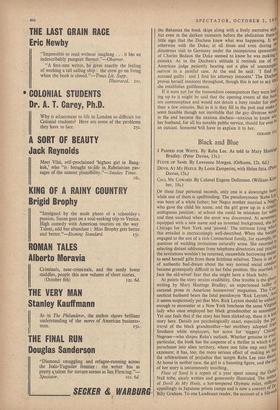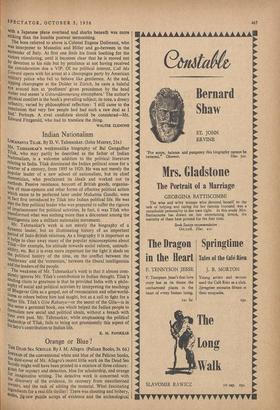Black and Blue
I PASSED FOR WHITE. By Reba Lee. As told to Mary Hastings Bradley. (Peter Davies, 15s.) CALL ME COWARD. By Colonel Eugene Dollmann. (William Kinv ber, 18s.) OF these four personal records, only one is a downright bore: while one of them is spellbinding. The pseudonymous 'Reba Lee was born of a white father; her Negro mother married a Negr,°, who gave the child his name, and the girl grew up in a crUalu ambiguous position : at school she could be mistaken for white and then snubbed when the error was discovered. At seventeeef; equipped with a new name and an invented background, she Chicago for New York and 'passed.' The intricate lying wrace this entailed is excruciatingly well-described. When she beCe111,c engaged to the son of a rich Connecticut family, for example, t"„ question of wedding invitations naturally arose. She resorted to selecting distant addresses from telephone directories and praying the invitations wouldn't be returned, meanwhile borrowing none!r to send herself gifts from these fictitious relatives. There is an at of authentic bad-dream about the way normal social condue: became grotesquely difficult in her false position. She married, tv face the old-wives' fear that she might have a black baby. At points the story strains credibility. One trouble is the ghost writing by Mary Hastings Bradley, an experienced ladler of caramel prose in American housewives' magazines. The C0ed. necticut husband bears the fatal pseudonym 'Rick Leyton; it seems suspiciously pat that Mrs. Rick Leyton should be unitn enough to encounter at a New York luncheon the same Virgiel, lady who once employed her black grandmother as seamstress' Yet one feels that if the story has been slicked-up, there is a tine story here. Details are psychologically exact, especially the P°01 trayal of the black grandmother—her snobbery adopted frog Southern white employers, her scorn for `niggery' Chieabry Negroes—who shapes Reba's outlook. Whether genuine in eve lv particular, the book has the suspense of a thriller in which acing parachutes into alien territory, where one false step may feeli exposure; it has, too, the more serious effect of making us the arbitrariness of prejudice that tempts Reba Lee into deee', At home in neither race, the girl is a haunting figure, and the end of her story is uncommonly touching. led Flute of Sand is a report of a year spent among the - n 1-1 Nail tribe, nicely written and generously illustrated. The auttin of Devil At My Heels, a hot-tempered Olympic miler, suffered , appallingly in Japanese prison camps and is now a convert of P Billy Graham. To one Laodicean reader, the account of a life-raft With a Japanese plane overhead and sharks beneath was more striking than the humble postwar sermonising.
The bore referred to above is Colonel Eugene Dollmann, who was interpreter to Mussolini and Hitler and go-between in the surrender of Italy. At first one finds his frank loathing for the victors stimulating, until it becomes clear that he is moved not by devotion to his side but by petulance at not having received the consideration due a VIP. Of no political interest, Call Me Coward opens with his arrest at a champagne party by American military police who fail to behave like gentlemen. At the end, sipping champagne at the Dolder in Zurich, he casts a baleful eYe around him at 'profiteers' given precedence by the head waiter and senses 'a Ciitterddinmerung atmosphere.' The author's Physical comfort is the book's prevailing subject; its tone, a dreary urbanity, varied by philosophical reflection: 'I still came to the conclusion that very few people had had such a raw deal as I had.' Perhaps. A rival candidate should be considered—Mr. Edward Fitzgerald, who had to translate the thing.
WALTER CLEMONS



















































 Previous page
Previous page